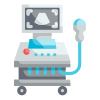Fill out form to enquire now
Cranial Ultrasound
Cranial ultrasound is an advanced diagnostic imaging method that examines both the anatomical structures and functional activity of the brain. This non-invasive technique is mainly performed in newborns because their flexible bones allow sound waves to travel and produce clear images of cerebral activity. Cranial ultrasounds are very important in diagnosing different conditions, including brain hemorrhages, infections, or developmental abnormalities in newborns and young children. In adults, cranial ultrasounds are rare and are usually only done in specific cases, such as monitoring brain tumors or assessing blood flow in certain areas.
Dependable, state of the art imaging Cranial ultrasounds, backed up with competent expert personnel and administered. Being conscious of the demand to meet accuracy while preserving a warm, soothing impression around its patients, ensures each patient’s needs are diagnosed upon need. This quest for high quality care at reasonably aggressive rates, in providing truly personable service leads one towards considering Medintu an optimum choice for that very reason.
What is Cranial Ultrasound
A cranial ultrasound is a kind of diagnostic imaging technique that uses high-frequency acoustic waves to develop detailed images of the brain and its surroundings. Its primary applications are:
- Infants and Newborns: Diagnosis of disorders; such includes hydrocephalus, hemorrhages, and infections.
- Premature Infants: Observing neurological growth and identifying potential complications.
- Adults (Rarely): Examination of conditions, for example, stroke or brain tumors using specialized techniques.
The procedure is painless and radiation-free, and safe for patients of all ages, making it especially valuable in delicate cases in newborns and infants.
Why is a Cranial Ultrasound Needed?
Many conditions have their conditions diagnosed or monitored through cranial ultrasounds as a procedure.
- Hydrocephalus: It diagnoses abnormal fluid accumulation within the brain.
- Brain Hemorrhages: Bleeding in the brain: It occurs very commonly in preterm infants.
- Neurological Infections: Useful in the diagnosis of meningitis or encephalitis.
- Developmental Concerns: Measures the development and structural development of the brain.
- Tumors and Cysts: Detects anomalies in rare instances among adults.
- Assessment for Stroke: Determines blood flow in specific brain regions.
Common Conditions Diagnosed with Cranial Ultrasound
- Intraventricular hemorrhage.
- Periventricular leukomalacia (PVL).
- Meningitis or encephalitis.
- Hydrocephalus.
- Intracranial cysts or neoplasms.
Preparation for a Cranial Ultrasound
- Infants or newborns: A person does not need preparation for this as the infant could be fed or comforted.
- For adults: Should be followed strictly to the letter by doctors.
- Supply Medical Records: Bring old medical or imaging records for reference.
What is the Procedure for Cranial Ultrasound
- Setup: The patient, invariably an infant, is positioned comfortably, usually on the lap of a caregiver.
- Gel Application: A translucent gel is applied to the scalp to enhance the transmission of sound waves.
- Imaging: The transducer is placed and moved over the fontanelles of infants or specific areas in adults.
- Time: This process takes 15–30 minutes depending on the complexity.
Safety and benefits of cranial ultrasound
Safety:
- Non-invasive and painless.
- No radiation exposure, therefore safe to be used with infants and vulnerable patients.
- Low chances of experiencing pain or side effects.
Benefits:
- Represents a complete visualization of cerebral anatomy.
- The fast identification of neurological disorders is facilitated.
- It allows real-time visualization for proper diagnoses.
- Offers persistent monitoring of developmental issues.
- Test Type: Cranial Ultrasound
- Preparation:
- Wear loose, comfortable clothing or change into a hospital gown if required.
- Avoid wearing metal objects, including jewelry and accessories.
- Inform the technician of any medical implants or known allergies.
- Empty your bladder before the scan
Fast for 4 hours before the scan
Follow any specific instructions from your doctor
Share your medical history
Reports Time: Within 24 hours
Test Price: Starts from ₹ 1500 to ₹ 3000
What is a cranial ultrasound?
This test creates images of the brain using sound waves. Such tests are usually performed on newborns to determine whether conditions such as hemorrhage, infections, or fluid buildup may be present in the head area.
Is cranial ultrasound of newborn infants safe?
Indeed, the procedure is absolutely safe and painless. It uses sound waves instead of radiation, and so it is especially apt for infants and neonates.
How long does a cranial ultrasound take?
The procedure generally takes 15 to 30 minutes, depending upon particular diagnostic requirements.
Does a cranial ultrasound require special preparation?
No specific preparation is required in infants. For adults, further explanation can be provided as necessary.
Can cranial ultrasound detect brain tumors?
It can identify tumors in some cases, though its use in adults is very limited. Advanced imaging techniques may be preferred to get detailed assessments.
Why are premature babies scanned through a cranial ultrasound?
It can be used in monitoring developments in the brain and possible complications, such as hemorrhages or abnormalities in development, among premature babies.
Why Choose Medintu for Cranial Ultrasound?
Medintu stands for good value in the realm of cranial ultrasound diagnostics, utilizing state of art technology coupled with considerable experience. You can rely on us to be right, be smooth, and individual to guarantee the perfect results for your diagnostic needs. At Medintu, high-end ultrasound technology is utilized by trained individuals who are capable of handling even the most complex situations, such as preterm babies and high-risk patients. Our expert radiologists ensure reliable diagnoses by providing correct interpretations of imaging results. We value timely care, provide flexible scheduling, and have quick appointments with same-day reporting for most tests. Our NABL accredited laboratories are at par with the highest standards of diagnostic excellence while being affordable to everyone.





